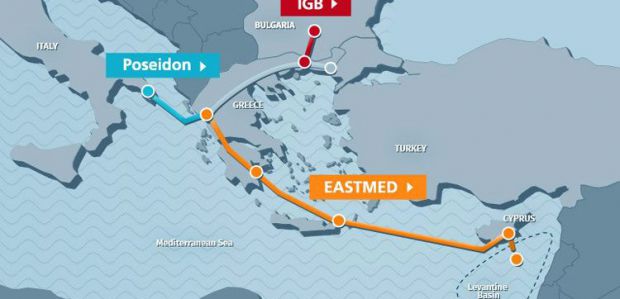The energy ministers of Greece, Cyprus and Israel are set to sign a trilateral agreement in Athens this afternoon for the development of East Med, a natural gas pipeline to carry gas to Europe via the three countries and Italy.
The pipeline, planned to measure 2,000 km and offer a capacity ranging between 10 to 20 billion cubic meters, promises to reinforce the Greek-Cypriot-Israeli alliance amid times of heightened Turkish provocation in the region.
Italian economic development minister Stefano Patuanelli, responsible for the country’s energy portfolio, has forwarded a letter of support for the project to Greek energy minister Costis Hatzidakis.
The Greek minister will sign the East Med agreement today with Giorgos Lakkotrypis and Yuval Steinitz, his Cypriot and Israeli counterparts, respectively. Italy is also expected to eventually join the partnership for this project.
Just hours before this signing ceremony, planned for 15:45, Greek gas utility DEPA and Energean Oil & Gas, active in the wider Mediterranean region, will sign a Letter of Intent at the energy ministry.
Importantly, this agreement promises to pave the way for a first commercial agreement reserving natural gas quantities ahead of the East Med pipeline’s construction, as DEPA will commit to purchasing natural gas quantities from Energean, extracting at Israeli gas field licenses. These quantities will represent approximately 20 percent of the East Med pipeline’s initial capacity.
The development prospects of East Med were recently propelled by a decision from IGI Poseidon, a 50-50 joint venture involving DEPA and Italy’s Edison, to accelerate the completion of all pending issues needed for the project’s maturity.
An upcoming East Med Gas Forum, to take place in Cairo January 15 and 16 with participation from the energy ministers of Greece, Cyprus, Israel, Egypt, Jordan and the Palestinian Authority, should help add further dimension to the alliance.
The East Med pipeline, planned as a complementary route to other projects in the wider region, stands as the most mature component of an EU plan entailing the development of an energy corridor to connect new energy sources in the east Mediterranean with European markets, including the southeast European market.





